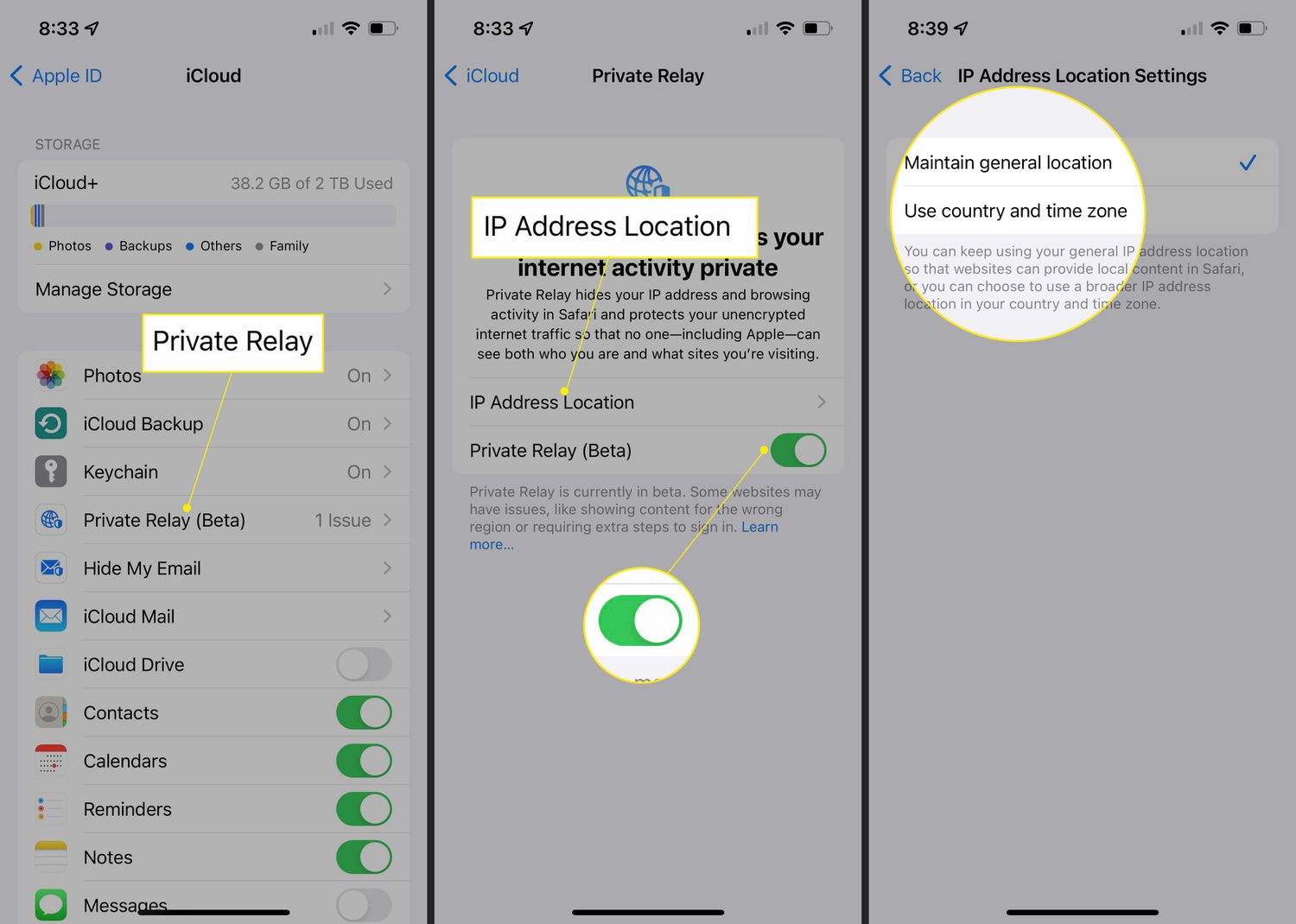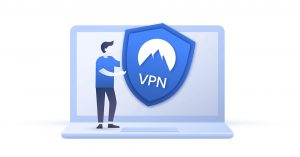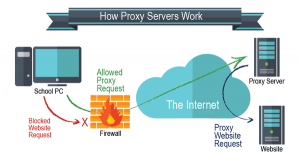Introduction
Internet privacy has become a major concern in today’s digital age. One crucial element of online privacy is your IP address, which is a unique identifier assigned to your device when it connects to the internet. Every online activity you engage in, from browsing websites to sending emails, leaves behind a digital footprint tied to your IP address.
While your IP address is necessary for internet communication, it also reveals your physical location, making you vulnerable to various online threats. Hackers may exploit your IP address to track your online activities, steal sensitive information, or launch targeted attacks. Additionally, advertisers and data brokers use IP addresses to gather information about your browsing habits and preferences.
To protect your privacy and maintain anonymity online, it is crucial to find ways to hide your IP address. By concealing your true IP address, you can browse the internet without revealing your physical location, enhance your overall online security, and regain control over your personal information.
In this article, we will explore various methods that you can employ to hide your IP address effectively. Whether you want to access geo-restricted content, protect your online identity, or simply enhance your privacy, these methods can help you achieve your goals.
Why would you want to hide your IP address?
There are several valid reasons why you might want to hide your IP address. Here are a few common scenarios:
- Enhancing online privacy: By hiding your IP address, you can prevent websites, advertisers, and various online entities from collecting your personal information and tracking your online activities. This helps maintain your privacy and ensures that your online behavior remains confidential.
- Bypassing geo-restrictions: Certain websites and online services restrict access to specific regions. By hiding your IP address, you can bypass these restrictions and gain access to content that would otherwise be unavailable in your location.
- Preventing targeted attacks: Cybercriminals and hackers often target specific IP addresses to launch attacks or gain unauthorized access to devices. By hiding your IP address, you can minimize the risk of becoming a target and protect your system from potential threats.
- Protecting your online identity: Your IP address can reveal your physical location, making it easier for cybercriminals to collect personal information or engage in identity theft. Hiding your IP address adds an extra layer of security and makes it more difficult for malicious actors to trace your online activities back to you.
- Evading online censorship: In some countries or regions, access to certain websites or online services may be restricted by the government or other authorities. By hiding your IP address, you can bypass these restrictions and freely access the information and services you need.
These are just a few examples of why you might want to hide your IP address. Whether you are concerned about your privacy, want to access geo-restricted content, or simply safeguard your personal information, hiding your IP address provides an effective solution.
Methods to hide your IP address
There are several reliable methods you can use to hide your IP address and protect your online privacy. Here are some of the most effective methods:
- Use a Virtual Private Network (VPN): A VPN creates a secure encrypted connection between your device and a remote server. It masks your IP address and assigns you a temporary IP address from the server’s location. This allows you to browse the internet anonymously and securely.
- Use a Proxy Server: Proxy servers act as intermediaries between your device and the websites you visit. When you use a proxy server, your IP address is replaced with the IP address of the server. This helps in hiding your original IP address and maintaining your privacy.
- Use Tor (The Onion Router): Tor is a free software that routes your internet traffic through a network of volunteer-run servers. It encrypts your data multiple times, making it incredibly difficult for anyone to trace your online activities back to your IP address.
- Use a mobile hotspot: By connecting to the internet through a mobile hotspot, you can hide your IP address behind the public IP address assigned to the mobile network. This provides an additional layer of anonymity while browsing.
- Use a public Wi-Fi network: Public Wi-Fi networks often have a different IP address from your home network. By connecting to a public Wi-Fi network, you can mask your original IP address and browse the internet anonymously.
- Change your IP address with a VPN router: If you want to secure all devices connected to your home network, you can set up a VPN router. This allows you to route all internet traffic through the VPN and automatically change the IP address for all devices.
Each of these methods provides a different level of privacy and convenience. Depending on your specific requirements and preferences, you can choose the method that best suits your needs.
Use a Virtual Private Network (VPN)
A Virtual Private Network (VPN) is one of the most popular and effective methods to hide your IP address and maintain online privacy. A VPN works by creating a secure encrypted connection between your device and a remote server operated by the VPN provider.
When you connect to a VPN server, your internet traffic is routed through this server before reaching its destination. As a result, your IP address is masked, and you are assigned a temporary IP address associated with the server’s location. This means that websites, advertisers, and other online entities will see the VPN server’s IP address instead of your own.
Here’s how using a VPN can benefit you:
- Secure and private browsing: A VPN encrypts your internet traffic, making it unreadable to anyone trying to intercept it. It prevents hackers, government agencies, and ISPs from monitoring your online activities and steals sensitive information.
- Access to geo-restricted content: Many streaming platforms, such as Netflix and Hulu, have geo-restrictions in place. With a VPN, you can connect to a server located in a different country and access content that is otherwise unavailable in your region.
- Bypassing censorship: In some countries, governments impose strict internet censorship, blocking access to certain websites and services. By using a VPN, you can bypass these restrictions and freely browse the internet without limitations.
- Protecting sensitive data on public Wi-Fi: Public Wi-Fi networks are notorious for their security vulnerabilities. By connecting to a VPN while using public Wi-Fi, your internet traffic is encrypted, ensuring that your data remains secure and protected from potential hackers.
- Anonymous torrenting: If you engage in peer-to-peer file sharing, using a VPN is essential to hide your IP address from other users. This allows you to download and share files without revealing your true identity.
With the increasing importance of online privacy, investing in a reliable VPN service is a wise decision. It enables you to browse the internet securely, access geo-restricted content, and maintain your anonymity online.
Use a Proxy Server
Another method to hide your IP address is by using a proxy server. A proxy server acts as an intermediary between your device and the websites you visit. When you make a request to access a website, it is first routed through the proxy server, which then forwards the request to the website on your behalf.
By using a proxy server, your IP address is replaced with the IP address of the server. This means that the website you are visiting sees the proxy server’s IP address instead of your own. This effectively hides your true IP address and helps protect your online privacy.
Here are some key benefits of using a proxy server:
- Anonymity: By hiding your IP address, a proxy server enhances your online anonymity and prevents websites from identifying and tracking your activities.
- Bypassing restrictions: Proxy servers can be used to bypass regional restrictions or censorship imposed by governments or organizations. By connecting to a proxy server located in a different region, you can access content that may be blocked in your location.
- Cached web pages: Proxy servers often keep a cache of web pages, which can result in faster loading times when accessing frequently visited websites.
- Filtering content: Some proxy servers provide content filtering capabilities, allowing you to block certain websites or content categories that you do not wish to access.
- Load balancing: Proxy servers can distribute incoming traffic across multiple servers, helping to improve performance and avoid server overload.
It is important to note that proxy servers come in different types, including HTTP, HTTPS, SOCKS, and transparent proxies. Each type has its own advantages and functionalities, so it’s essential to choose the right proxy server based on your specific needs.
While proxy servers can be effective in hiding your IP address, it’s important to use reputable and trustworthy proxy services. Free or public proxies may not offer the same level of security and privacy as paid or premium options. Additionally, it’s recommended to use HTTPS proxy servers whenever possible, as they provide encrypted and secure communication between your device and the server.
By utilizing a proxy server, you can hide your IP address and enjoy a certain degree of anonymity while browsing the internet, accessing restricted content, or protecting your online activities from being tracked by third parties.
Use Tor (The Onion Router)
Tor, also known as The Onion Router, is a free and open-source software that provides a high level of anonymity by routing your internet traffic through a network of volunteer-run servers around the world. It encrypts your data multiple times, making it extremely difficult for anyone to trace your online activities back to your IP address.
When you use Tor, your internet traffic is bounced through several randomly selected Tor nodes, also known as relays, before reaching its final destination. Each relay only knows the IP address of the previous and next relays, effectively creating layers of encryption like layers of an onion.
Here are some reasons why Tor can be an effective method to hide your IP address:
- Anonymity: Tor hides your IP address by routing your internet traffic through a complex network of relays, making it nearly impossible to trace your online activities back to your original IP address.
- Security: Tor provides end-to-end encryption, ensuring that your data remains secure and protected from eavesdroppers or surveillance.
- Access to the Dark Web: The Tor network enables access to websites and services hosted on the Dark Web, an encrypted part of the internet that is not accessible through traditional search engines.
- Bypassing censorship: Tor can help you bypass internet censorship imposed by governments or organizations that restrict access to certain websites or services.
- Circumventing location-based restrictions: By routing your internet traffic through Tor, you can appear to be accessing the internet from a different location, allowing you to bypass geographically-based restrictions.
However, it’s important to note that using Tor may result in slower internet speeds due to the multiple layers of encryption and routing. Additionally, not all websites or services are Tor-friendly, and some may block or restrict access to Tor users.
It’s also crucial to practice good security measures when using Tor. While Tor provides a high level of anonymity, it cannot protect against malware, phishing attacks, or other security threats. Therefore, it’s recommended to use an up-to-date antivirus program, avoid downloading files from unfamiliar sources, and exercise caution when sharing personal information online.
Overall, Tor can be an excellent option for those seeking a high level of anonymity and privacy. By utilizing the multi-layered encryption and routing capabilities of Tor, you can effectively hide your IP address and protect your online activities from prying eyes.
Use a mobile hotspot
Using a mobile hotspot is another method to hide your IP address and maintain online privacy. A mobile hotspot allows you to connect your device to the internet using your mobile data plan instead of a traditional Wi-Fi network.
When you connect to the internet through a mobile hotspot, your IP address is masked behind the public IP address assigned to your mobile network. This means that websites and online services will only see the public IP address associated with the mobile network, rather than your device’s unique IP address.
Here are some key advantages of using a mobile hotspot to hide your IP address:
- Anonymity: By using a mobile hotspot, you can hide your device’s IP address and browse the internet anonymously.
- Portability: Mobile hotspots allow you to access the internet on the go, providing you with a reliable and secure connection wherever you are.
- Bypassing network restrictions: In some cases, organizations or institutions may impose restrictions on certain IP addresses or Wi-Fi networks. By using a mobile hotspot, you can bypass these restrictions and access the internet freely.
- Secure connection: Mobile hotspots often provide encrypted connections, ensuring that your data is protected from potential threats when connected to the internet.
- Minimal traceability: By using a mobile hotspot, you leave behind fewer traces of your online activities since the public IP address associated with the mobile network is shared among multiple users.
It is worth noting that utilizing a mobile hotspot may have some drawbacks. Depending on your mobile data plan, there may be limitations on data usage and potential additional charges for exceeding your data limit. Additionally, the speed of your internet connection can be influenced by factors such as network coverage and the number of simultaneous users connected to the mobile network.
When using a mobile hotspot, it is essential to secure your connection by setting a strong password and enabling encryption. This helps prevent unauthorized access to your hotspot and ensures that your internet traffic remains private and secure.
Overall, using a mobile hotspot as a method to hide your IP address can provide you with anonymity, portability, and the freedom to access the internet securely and bypass certain network restrictions. It is a convenient option for those who require a flexible and private internet connection while on the move.
Use a public Wi-Fi network
Another method to hide your IP address is by utilizing a public Wi-Fi network. Public Wi-Fi networks, such as those found in cafes, airports, or libraries, allow you to connect to the internet without using your home network or mobile data plan.
When you connect to a public Wi-Fi network, your IP address is replaced with the IP address associated with that particular network. This means that websites and online services will see the public IP address of the Wi-Fi network instead of your personal IP address.
Here are some advantages of using a public Wi-Fi network to hide your IP address:
- Anonymity: By connecting to a public Wi-Fi network, you can obscure your IP address and maintain a level of anonymity while browsing the internet.
- Bypassing network restrictions: In certain scenarios, public Wi-Fi networks may offer access to websites or services that are blocked or restricted on other networks. By utilizing a public Wi-Fi network, you can bypass these restrictions and access the content you need.
- Shared IP address: Since multiple users connect to the same public Wi-Fi network, the IP address is shared among several devices. This makes it more challenging for anyone monitoring the network to trace your online activities back to your individual device.
- Cost-effective option: Public Wi-Fi networks are often free to use, making this method an affordable way to hide your IP address and browse the internet anonymously.
- Diverse location: Public Wi-Fi networks are available in various locations, allowing you to appear as if you are accessing the internet from different regions or cities. This can be beneficial when accessing content that is geographically restricted.
However, there are some considerations to keep in mind when using public Wi-Fi networks. These networks can be less secure compared to private networks, putting your personal data at risk. It’s essential to take precautions, such as using HTTPS websites, avoiding financial transactions or sharing sensitive information, and using a virtual private network (VPN) for additional security and privacy.
Additionally, the speed and reliability of public Wi-Fi networks may vary depending on the location and the number of users connected at any given time. It’s also vital to ensure that you are connecting to a legitimate and secure Wi-Fi network, as some hackers may set up fake networks to intercept sensitive data.
Using a public Wi-Fi network can provide you with the benefits of hiding your IP address while enjoying the convenience of internet access outside of your home network. By taking appropriate security measures, you can maintain your privacy and anonymity while connecting to these networks.
Change your IP address with a VPN router
Changing your IP address with a VPN router is an effective way to hide your IP address and protect your online privacy. A VPN router is a device that allows you to connect multiple devices in your home network to a VPN, ensuring that all internet traffic from those devices is encrypted and routed through the VPN.
By connecting to a VPN router, your IP address is replaced with the IP address of the VPN server you are connected to. This means that all devices connected to the router will share the same IP address, providing an additional layer of anonymity and making it more difficult for websites or online services to trace your individual IP address.
Here’s how utilizing a VPN router can benefit you:
- Network-wide privacy: A VPN router allows you to protect all devices connected to your home network, including computers, smartphones, gaming consoles, and smart home devices. This ensures that all internet traffic from these devices is encrypted and routed through the VPN.
- Multiple device support: Unlike using individual VPN clients on each device, a VPN router simplifies the process by encrypting and routing all traffic from every device in your network through a single VPN connection.
- Location flexibility: By using a VPN router, you can choose the server location of your VPN connection, giving you the ability to appear as if you are accessing the internet from a different country or region.
- Enhanced security: A VPN router provides a higher level of security for your entire home network. It encrypts your data and prevents unauthorized access, protecting your personal information and sensitive data from potential threats.
- Access to region-restricted content: Changing your IP address with a VPN router lets you bypass geo-restrictions and access region-specific content or services that may be blocked in your location.
Setting up a VPN router typically requires a router that supports VPN connections, as well as a VPN subscription. You’ll need to follow the specific instructions provided by your VPN provider to configure the router with the necessary settings and credentials.
It’s important to keep in mind that the performance of your internet connection may be affected by using a VPN router, as the encryption and routing process can add some level of overhead. Additionally, the VPN provider you choose should be reputable and offer reliable service to ensure a secure and uninterrupted connection.
By changing your IP address with a VPN router, you can enjoy network-wide privacy, enhanced security, and the ability to access geographically restricted content. It’s an excellent option for individuals who want to ensure the privacy and security of their entire home network.
Conclusion
Protecting your privacy and hiding your IP address is crucial in today’s digital age. With the increasing concern about online surveillance, cyber threats, and data breaches, it’s essential to take steps to safeguard your personal information and maintain anonymity while browsing the internet.
In this article, we explored several effective methods to hide your IP address:
- Using a Virtual Private Network (VPN) to create a secure and encrypted connection that masks your IP address.
- Utilizing a Proxy Server to route your internet traffic through a server that replaces your IP address with its own.
- Using Tor (The Onion Router) to route your internet traffic through a complex network of encrypted relays, providing a high level of anonymity.
- Connecting to a mobile hotspot to hide your IP address behind the public IP address assigned to the mobile network.
- Using a public Wi-Fi network to mask your IP address with the public IP address of the Wi-Fi network.
- Changing your IP address with a VPN router, providing network-wide privacy and enhanced security for all devices connected to your home network.
Each method offers its own advantages and considerations, and the choice depends on your specific needs and preferences.
It’s important to remember that while hiding your IP address can enhance your online privacy, it is not a foolproof solution. It’s essential to practice good cybersecurity habits, such as using strong and unique passwords, keeping your software and devices up to date, and being cautious when sharing personal information online.
By implementing the methods discussed in this article, you can take significant steps towards protecting your privacy, maintaining anonymity, and ensuring a more secure online experience. Whether for bypassing restrictions, accessing geo-restricted content, or simply safeguarding your personal information, hiding your IP address is a critical aspect of maintaining online privacy and security.

























